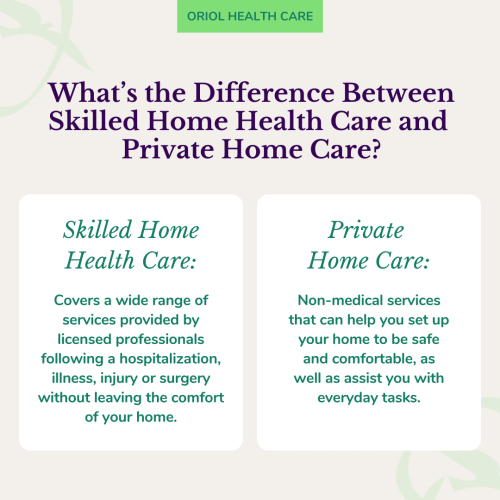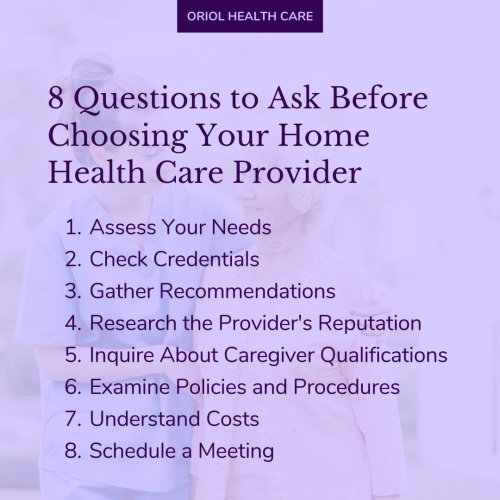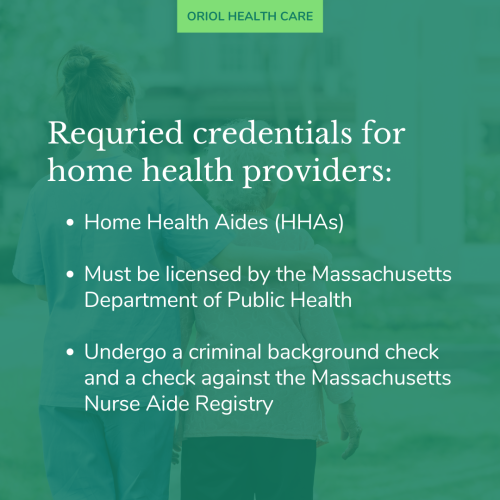8 Questions to Ask Before Choosing a Home Health Care Service
If you live here in the Holden area, you might already know that Oriol Health Care has been providing a continuum of care to our community for decades—especially in our nursing centers.
But, did you know we also offer in-home nursing, therapy and private home care services?
Since we’re often asked about home care from patients and caregivers across the area, we thought we’d share some common questions you may have when considering care at home.
What’s the Difference Between Skilled Home Health Care and Private Home Care?
Let’s start with skilled home health care and when this may be an option for you. Skilled home health care covers a wide range of services provided by licensed professionals (nursing and therapy) in your home following a hospitalization, illness, injury or surgery.
Receiving care in your home is more convenient and just as effective as care you may receive in another healthcare setting. This type of care is generally covered by insurance.
The primary benefit of Home Health Care is that you don’t have to leave the comfort of your home since the services go right to you. At Oriol Home Health, some of our skilled home health care services available to patients across the Greater Holden area include:
- Skilled nursing services
- Development and evaluation of your unique care plan
- Patient and caregiver education
- IV therapy
- Nutrition therapy
- Physical, Occupational, and Speech therapies
- Medication planning and education
During your recovery period, in addition to skilled medical care, you may also need private home care services. Oriol at Home includes the non-medical services that can help you set up your home to be safe and comfortable, as well as assist you with everyday tasks like bathing, getting dressed, doing laundry, and preparing meals during your recovery period. The cost for this kind of care is usually paid privately instead of being covered by your insurance.
The ultimate goal of your home health care support is to provide support, education and resources throughout your recovery so you can return to being independent and self-sufficient.

8 Questions to Ask Before Choosing Your Home Health Care Provider
Understanding home health care is the first step to being able to choose the ideal service for you or a loved one. Now that we’ve covered that, let’s review eight questions to ask as you start your journey to choose the service that’s right for you.
The team at Oriol Home Health pulled together the following checklist to help get started with the questions to consider:

1. What are your needs for Home Health Care?
The first step is to assess your needs or the needs of your loved one who needs care. This includes understanding the type of support that will be required while receiving home health care, including the frequency of visits, special equipment, and any specific needs or preferences.
For example, if you’re returning home after a surgery, you’ll need to determine what your post-operative support will require. This could range from wound care and bandage changes to in-home physical therapy for a few weeks. Or perhaps you’ll need the support to manage your medications?
Be sure to look beyond your physical needs. It’s important to also consider things like the need for assistance to connect to your follow up telehealth appointments while you recover. These are all things your home health care service can plan with you.

Your experience will be more successful when you know what to plan for before your visits even begin.
2. Does the Home Health provider have the required credentials?
It’s important to choose a home health care provider that’s licensed, insured, and accredited. Credential requirements will vary by state, so be sure to ask about the specifics where you live. For example in Massachusetts, home health care providers, like Oriol Home Health, are regulated by the Massachusetts Executive Office of Health and Human Services. Some of the requirements include:
- Home Health Aides (HHAs) need to be certified by the Massachusetts Department of Public Health.
- Home health care agencies must be licensed by the Massachusetts Department of Public Health.
Home health care providers must undergo a criminal background check and a check against the Massachusetts Nurse Aide Registry.

3. Does your network have recommendations?
Ask your doctors, nurses, friends, and family members if they have any recommendations for the home health care services you need. When you’re given options, dig deeper and ask for details about their recommendations.
A good question to ask is, “Would you use that service for your loved ones, if needed?” Also ask your referrals if they have direct experiences with the recommendations they’re making? Or are they sharing a ‘heard from a friend of a friend’ scenario?
While the best referral is word-of-mouth, be sure to cover all your bases and don’t just accept recommendations at face-value. If your immediate network is not able to offer solid recommendations, be sure to check with your local senior center, community organizations, or networking groups for referrals.
4. What’s the reputation of the service?
Research the service’s reputation by searching online for reviews, checking their social media pages, and researching their track record with local and national regulatory bodies. You may find helpful insights on Yelp, Google Reviews or even Angie’s List.
Other good resources include the Department of Public Health, Home Care Alliance, as well as the Better Business Bureau. Both of these organizations can share if complaints have been filed against the service and when they were made. This kind of public information is good to have available when you’re interviewing home health care providers.
5. What are the qualifications of the caregivers?
Just as question #2 asks about credentials, knowing the qualifications of your care team is important. Ask about the experience of the caregivers who will be providing your support. They should be licensed, certified, and experienced in providing the type of care you require.
6. What policies and procedures are in place?
Ask about the provider’s policies and procedures, such as their training programs, safety protocols, and their process for handling emergencies. Knowing this information can help you gain insight on the quality of care to expect for yourself.
Other policies and procedures to ask about include those around communications, especially if you need to escalate a concern or issue, such as billing and privacy.
7. How much will your Home Health Care services cost?
Home health care services will vary based on a number of factors. Your insurance coverage, as well as the frequency of your visits and any special equipment or medical devices you’ll need at home will all help to determine your costs.
That said, it’s important to know that many insurance programs, including Medicare, cover home health care services when ordered by a physician.
They can also help you navigate the path for resources you may not have even considered, such as Veterans benefits and Medicaid.
8. When can the Home Health Care provider meet to share more about their services?
Once you’ve addressed questions one through seven, it’s time to gather all of your research and schedule a meeting with the agencies you’re considering. This will be your opportunity to ask the questions to get the details you need so you can compare the services available to you. Most importantly, this initial meeting will give you an early indication for the type of care you’ll receive.
By doing your research with this handy checklist as your guide, you’ll be able to make an informed decision and choose the home health care service that’s right for you.
If you live in the Holden area, you have the benefit of Oriol Home Health being your neighbor to support you or a loved one who needs experienced in-home medical support from home health aides and skilled nurses. This in-home support can include assistance with your rehabilitative therapy and even medication. Oriol at Home offers non-medical home care, such as light housekeeping, help with bathing, and even companionship.


